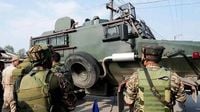In a dramatic escalation of tensions, sirens echoed through Jammu and Kashmir late Thursday night as multiple unidentified flying objects were detected along the international border. This incident, which triggered panic among residents, resulted in a complete blackout across several regions, including Jammu city, Akhnoor, Pathankot, and Poonch. The Indian defense systems successfully intercepted and shot down all incoming threats, averting potential disaster.
The situation unfolded on May 8, 2025, when Indian air defense guns responded immediately after Pakistan launched loitering munitions targeting key locations, including Jammu city's airport. Eyewitnesses reported hearing powerful explosions near the airport, leading to immediate power outages. The chaos prompted the authorities to enforce a complete blackout as a precautionary measure, with sirens sounding across the region.
Former DGP of Jammu and Kashmir, Shesh Paul Vaid, reassured the public on social media, stating, "Complete blackout in Jammu. Loud explosions—bombing, shelling, or missile strikes suspected. Fret not—Mata Vaishno Devi is with us, and so are the valiant Indian Armed Forces." His words echoed the sentiments of many in the region as fear gripped the populace.
This incident comes on the heels of India's recent military operation, dubbed 'Operation Sindoor,' which targeted nine terror camps in Pakistan and Pakistan-occupied Kashmir. The operation was a direct response to a brutal attack that left 26 people dead, predominantly tourists, in Pahalgam just weeks earlier.
As the night progressed, reports indicated that drones were also sighted in various areas of Pathankot, further escalating the situation. The Indian Armed Forces activated counter-measures, successfully downing several Pakistani drones using anti-drone systems. Eyewitnesses recounted seeing one drone crash just outside the airport premises, a stark reminder of the ongoing conflict.
In response to the aerial assaults, the Indian government implemented extensive security measures. Internet services were suspended across Jammu and Kashmir, and the Centre ordered 100% pre-boarding checks for all flyers at airports nationwide. This heightened security protocol reflects the seriousness of the situation and the government's commitment to safeguarding its citizens.
The escalation did not stop at Jammu. Reports indicated that Punjab, Rajasthan, and Haryana were placed on high alert as the conflict between the two nations intensified. Defense sources revealed that Pakistan had launched eight missiles targeting various regions, including Satwari, Samba, RS Pura, and Arnia, all of which were intercepted by Indian air defense systems. The Indian forces also shot down two Pakistani fighter jets during this period, showcasing their readiness and capability to respond to threats.
The situation in Jammu remained tense throughout the night, with loud explosions and sirens reported in multiple districts, including Kupwara, Samba, and Baramulla. The entire Srinagar area was plunged into darkness as blackouts were enforced, with officials confirming that the blackout would continue until further notice.
In a broader context, the current hostilities have drawn international attention. The U.S. Secretary of State, Marco Rubio, emphasized the need for immediate de-escalation during a conversation with Indian Foreign Minister S. Jaishankar. The Secretary encouraged direct dialogue between India and Pakistan, reflecting concerns over the rising tensions.
As the dust settles on this latest escalation, the implications for regional security remain profound. The Indian government has reiterated its commitment to non-escalation, provided that the Pakistani military respects this stance. However, with both sides accusing each other of launching drone attacks, the risk of further conflict looms large.
In a significant turn of events, the IPL match between Punjab Kings and Delhi Capitals, which was taking place in Dharamshala, Himachal Pradesh, was cancelled due to security concerns. The decision to evacuate the stadium and turn off its lights underscores the pervasive anxiety gripping the region.
As of now, the Indian Armed Forces have successfully neutralized multiple threats, ensuring that no critical infrastructure was damaged during the attacks. However, the situation remains fluid, with military officials on high alert and ready to respond to any further provocations from across the border.
In conclusion, the events of May 8, 2025, mark a significant escalation in the ongoing India-Pakistan conflict, with both nations on high alert and the international community watching closely. As tensions continue to rise, the hope for peace and stability in the region hangs in the balance.






